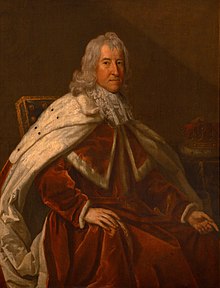John Robartes, 1st Earl of Radnor
|
The Right Honourable The Earl of Radnor PC |
|
|---|---|

John Robartes in 1683
|
|
| Lord President of the Council | |
|
In office 24 October 1679 – 24 August 1684 |
|
| Monarch | Charles II |
| Preceded by | The Earl of Shaftesbury |
| Succeeded by | The Earl of Rochester |
John Robartes, 1st Earl of Radnor and Viscount Bodmin PC (1606 – 17 July 1685), known as The Lord Robartes (or John, Lord Roberts) between 1634 and 1679, was an English politician, who fought for the Parliamentary cause during the English Civil War. He retired from public life before the trial and execution of Charles I (1649) and did not take an active part in politics until after the Restoration (England) in 1660. During the reign of Charles II he opposed the Cavalier party (because he wanted more toleration of non-Anglican religious sects). Towards the end of his life he opposed the more extreme Protestant groups, led by Ashley Cooper, 1st Earl of Shaftesbury, who refused to accept the succession of James because he was a self-declared Catholic.
Born in Truro, where his father, Richard Robartes was knighted in 1616, created a baronet in 1621 and raised to the peerage as Baron Robartes of Truro in 1625. The family had amassed wealth by trading in tin, wood and gorse(furze) used by the tin smelters, and in 1620 bought and began extending Lanhydrock House near Bodmin as the family seat. Richard became a baronet and the baronet's hand on the shields engraved on the principal door of Lanhydrock house bear testimony to this. The barony was purchased for £10,000 in 1625. This ennoblement was claimed, by the opponents of the Duke of Buckingham, to have been purchased under compulsion.
His son, John, was the first of the family to receive a university education, being educated at Exeter College, Oxford. His father became the friend of Robert Rich, 2nd Earl of Warwick and succeeded in arranging the marriage of his son to the Earl's younger daughter Lucy, thereby cementing an alliance which would bring John into contact with influential radical preachers of the time. Convinced of the more Calvinist doctrines of the Church of England, John became alarmed at the Arminian slant of King Charles I's religious policy and his increasingly autocratic rule; he believed the King had been misled by evil councillors. For this reason John Robartes fought on the side of the Parliament and, according to his view of things, also the King, during the Civil War. He fought with valour at the Battle of Edgehill 23 October 1642, and at the First Battle of Newbury, 20 September 1643.
...
Wikipedia
